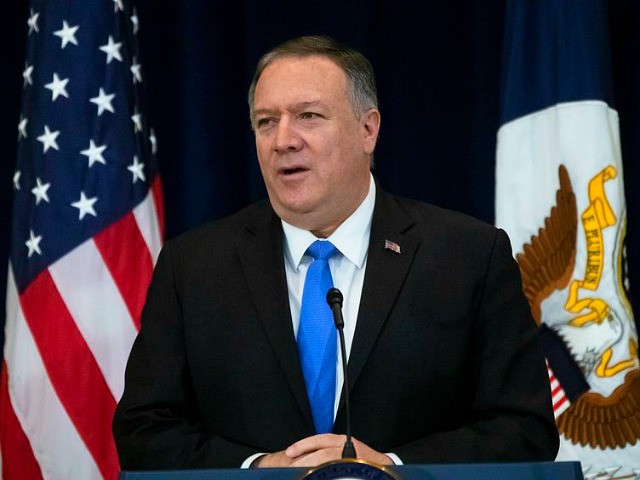Tensions in Iraq this week forced U.S. Secretary of State Mike Pompeo to delay a scheduled trip on Friday to meet Ukrainian President Volodymyr Zelensky, whose July 25 phone call with his American counterpart Donald Trump triggered the ongoing impeachment.
State Department spokesperson Morgan Ortagus revealed in a statement on Wednesday that Pompeo suspended the trip to Ukraine to remain in America’s capital “to continue monitoring the ongoing situation in Iraq and ensure the safety and security of Americans in the Middle East. Secretary Pompeo’s trip will be rescheduled in the near future and he looks forward to the visit at that time.”
The situation in Iraq has somewhat shifted the weeks-long attention away from impeachment.
Some news outlets are focusing on the turmoil in Iraq, home to thousands of American troops, repeatedly threatened by an umbrella organization of mainly Shiite Iran-allied militiamen known as the Popular Mobilization Forces/Units (PMF/U).
In November 2016, however, after the PMF helped the U.S. fight the Sunni Islamic State (ISIS/ISIL) who also wanted to annihilate the Shiites, the Iraqi Parliament legalized the PMF as a component of the U.S.-funded and backed Iraqi security forces [ISF].
In a rare show of bipartisanship these days, experts from both sides of the political spectrum warned U.S. senators that the Iran-backed militiamen would threaten the United States.
Pompeo recently accused Obama administration officials of trying to undermine the Trump administration’s “maximum pressure” sanctions campaign, noting that as a result of the sitting president, Iranian proxies like Hezbollah and its offshoots have less money.
In a national security podcast sponsored by the American Enterprise Institute (AEI), Pompeo said, “The Trump administration is succeeding in its efforts to destabilize the regime of Tehran. For Obama officials to actively undermine those efforts is disgraceful.”
Despite opposition from the Pentagon, which praised the PMF under former President Barack Obama, Pompeo’s Department of State (DOS) officially designated a PMF faction and its leader — Harakat Hezbollah al-Nujaba and Akram al-Kabi — as Specially Designated Global Terrorists (SDGTs).
The Secretary of State is also seeking to deem other PMF factions as terrorists, including AAH, which has American military blood on its hands from the first U.S. invasion of Iraq between 2003 and 2011.
The U.S. has deemed the PMF faction known as Kataib Hezbollah (KH) as the culprit of the recent attack on a U.S. embassy in Baghdad and of launching the rocket that killed the American contractor in Kirkuk.
After the defeat of the Islamic State (ISIS) in Mosul, soon before Trump took office, the Pentagon praised the PMF’s support in destroying the jihadis.
Breitbart News has repeatedly asked the Pentagon whether it considers the PMF in Iraq a threat, and the Defense Department always says fighting the force that includes Iran-allied militiamen is not part of their mission. The United States considers Iran the chief sponsor of terrorism in the world.
Nevertheless, some PMF fighters and U.S. troops did fight side by side to defeat ISIS.
Last month, the Trump administration succeeded in sanctioning leaders of some PMF sanctions.
In recent days, Ayatollah Ali al-Sistani, Iraq’s top Shiite cleric, has joined the Kataib Hezbollah PMF faction in condemning the United States. The cleric accused the U.S. of violating Iraqi sovereignty by retaliating with airstrikes that left an estimated 25 members of the PMF faction that killed the American contractor.
Echoing previous comments, KH threatened retaliation for the “aggression of evil American ravens,” the Wall Street Journal reported Monday.
Pompeo currently has his hands full, forced to deal with increasing Iran-fueled chaos in Iraq.
The decimation of the American embassy in Baghdad began as the rest of the world celebrated the end of 2019. A few days later, the murder of the American contractors took place during a rocket attack in Iraq’s Kirkuk region by a group of people backed by a country that constantly likes to sing, “Death to America.”
There were no reported deaths or injuries during the two-day attack on the American embassy.
As U.S. allies, the Iraqi Security Forces (ISF) were supposed to be protecting the American embassy, but it appears their PMF allies met little resistance when they attacked.
In a statement issued Wednesday, spokesperson Ortagus said the United States “stressed the Government of Iraq’s obligation to prevent further attacks against our diplomatic mission.”
During his conversation with Iraqi Prime Minister Adil Abdul Mahdi, Pompeo reportedly “condemned, in the strongest possible terms, the December 31 Iran-backed terrorist attack on U.S. Embassy Baghdad.”
Amid the unfolding situation in Iraq, the U.S. President has issued orders to send to Kuwait an estimated 4,000 members of the storied U.S. Army’s 82nd Airborne Division’s alert brigade, an elite division specializing in air assault, including 750 paratroopers expected to deploy to the region immediately, Defense Secretary Mark Esper revealed in a statement.
Fox News noted:
There are roughly 5,000 U.S. troops currently deployed to Iraq now, among the roughly 60,000 U.S. troops currently deployed to the region. According to the Pentagon, 14,000 have been added since May as the threat from Iran increased.
For Pompeo, the fragile situation in Iran forced him to cancel a multinational tour that included stops in Belarus, Kazakhstan, Uzbekistan, and Cyprus.
Some estimates place the number of PMF fighters in Iraq at around 150,000. By some account, they have reached unprecedented power in Iraq.

COMMENTS
Please let us know if you're having issues with commenting.